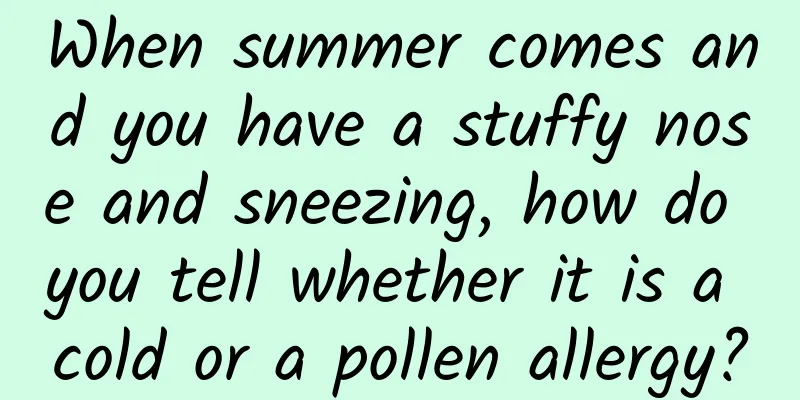When summer comes and you have a stuffy nose and sneezing, how do you tell whether it is a cold or a pollen allergy?

|
In spring, flowers are in full bloom, and pollen inhaled into the respiratory tract can easily cause symptoms such as nasal congestion and sneezing. The large temperature changes in spring can also easily cause colds. From the symptoms, pollen allergy and colds are somewhat similar, so how can you distinguish whether you have a cold or an allergy? Let's take a look at the difference between pollen allergy and colds. 1. Symptoms The symptoms of pollen allergy and cold are very similar, such as nasal congestion, sneezing, etc. The symptoms of hay fever look like a cold. In addition to runny nose, sneezing, and nasal congestion, a cold may also cause a headache, sore throat or fever, but generally no itchy nose, itchy eyes, red and swollen eyes, itchy ears, etc., so "itching" is the best way to distinguish between a cold and hay fever. 2. Causes Pollen allergy is caused on one hand by the improvement of people's living standards, and the intake of a large amount of high-protein, high-calorie foods such as eggs and meat products in the diet, which results in the hyperactivity of the body's ability to produce antibodies, so when encountering antigens such as pollen, it is more likely to have an allergic reaction. On the other hand, it is because of air pollution, water pollution and the extensive use of food additives, which cause the human body to come into contact with more antigenic substances, prompting humans to develop allergic diseases. A cold is caused by various factors that lead to a decrease in the systemic or local respiratory defense function. For example, catching a cold, getting caught in the rain, sudden climate changes, excessive fatigue, etc. can cause viruses or bacteria that already exist in the upper respiratory tract or invade from the outside to multiply rapidly, thus inducing the disease. 3. Season Pollen allergy has obvious seasonality, and its incidence rate increases with the flowering season and windy weather. The seasonality of pollen can be roughly divided into three types, namely spring type, summer type and autumn type. Colds have no obvious seasonality, although they may be more common in winter and during the transition between seasons. 4. Course of disease The course of pollen allergy is the same as the pollen season, it is not contagious, and usually lasts from one to several months. Colds are contagious and last 1-2 weeks. 5. Treatment Patients who are allergic to pollen generally use medication for symptomatic treatment when allergic symptoms occur, such as nasal congestion, itching, and difficulty breathing, but the most fundamental thing is to undergo desensitization treatment. Patients with common colds can simply rest more, drink plenty of water, and take symptomatic treatment with medication. 6. Prevention Patients who are allergic to pollen need to be careful not to play outdoors during the blooming season or in windy weather, and should remember to close doors and windows to prevent pollen from entering the room. Also, be careful not to get pollen on clothes and bedding. To prevent colds, you need to exercise regularly, eat a balanced diet, build up your body's resistance, be careful not to catch cold, and avoid crowded and poorly ventilated places during the flu season. |
<<: Twitter's advertising promotion strategy and revenue analysis
Recommend
What is uterine fibroids?
We often hear the term uterine fibroids, and we a...
Multiple vulvar ulcers
Vulvar ulcer refers to the loss or desquamation o...
How to delay menstruation during the college entrance examination
Many students have studied hard for ten years jus...
The benefits and taboos of hot spring bathing, be sure to read it!
Because the weather is cold and dry in autumn and...
Why do women get pregnant?
For married women, they all hope to have their ow...
How to choose mooncakes for Mid-Autumn Festival? Five things to know about eating mooncakes
Key Points ★ When choosing mooncakes, check the n...
Is 12mm endometrial thickness normal?
Generally speaking, the thickness of the endometr...
Can pregnant women eat tomatoes mixed with sugar?
Pregnant women have a difficult time absorbing su...
Reasons why menstruation has not come yet
Nowadays, people's diet is becoming more and ...
Women who stay here will definitely not be able to find a boyfriend
Due to the special physiological structure, it is...
What to do if your vagina is itchy after a cesarean section
Postpartum women will have vaginal discharge, esp...
Four characteristics of myocardial infarction in women
Myocardial infarction is relatively common in cli...
What is the black discharge after menstruation?
After the menstruation is over, some secretions w...
Estrogen cream applied to the vagina to relieve menopause
When women enter menopause, they will experience ...
How long does implantation pain last?
Pregnancy is a very difficult process for women, ...









